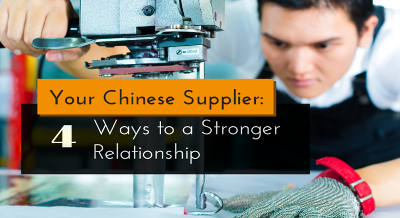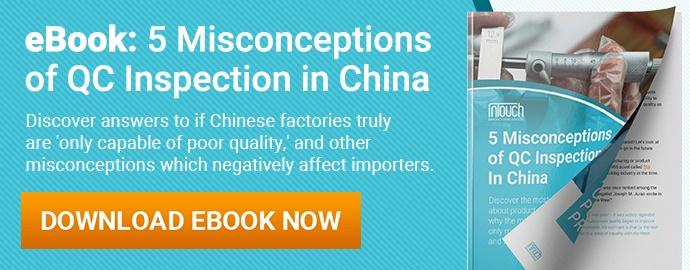 You’ve placed a few orders with a new factory, and things are going well. You’ve got the makings of a healthy supplier relationship, but what can you do to maintain and further grow the relationship in the long term?
You’ve placed a few orders with a new factory, and things are going well. You’ve got the makings of a healthy supplier relationship, but what can you do to maintain and further grow the relationship in the long term?
A lot of buyers of Chinese-made goods struggle to get the products they want at the quality their customers expect. Below are four approaches to further develop the relationship with your Chinese supplier for the long term. Learn about these ways to work better with your supplier, not against it.
Develop relationships with the production and quality team in the factory – not just the sales staff
When you come to China to visit suppliers, your main contact is usually a sales person whose goal is to have you inside the factory scrutinizing your product’s assembly as LITTLE as possible. This often means giving you a tour of the production area as quickly as possible.
Insist on additional factory time and prepare a list of topics about your products and issues you may want to discuss. Ask to get the production and quality  control staff involved as well. As you might imagine, it is very likely you’ll be confronted with a language barrier if you don’t speak the local language. Overcome this by hiring an independent translator as suggested in a previous article, 4 Tips for a Better China Business Trip. You can ensure that your message is reaching the right people by speaking to the production and quality team directly whenever possible. If you choose to communicate through your sales contact instead, you’re relying on someone that probably lacks intimate technical knowledge of your product to pass that message along to the relevant factory staff.
control staff involved as well. As you might imagine, it is very likely you’ll be confronted with a language barrier if you don’t speak the local language. Overcome this by hiring an independent translator as suggested in a previous article, 4 Tips for a Better China Business Trip. You can ensure that your message is reaching the right people by speaking to the production and quality team directly whenever possible. If you choose to communicate through your sales contact instead, you’re relying on someone that probably lacks intimate technical knowledge of your product to pass that message along to the relevant factory staff.
Invite your Chinese supplier out for dinner
Feeling obligated to go to dinner with your supplier made its way into the 5 Cultural Traps in China that we covered in the past. Factories are always overly hospitable to foreign guests since this gesture is an important part of Chinese culture. Buyers get sick and tired of it – and so do factories.
Why not invite them for a meal?
“Wining and dining” clients makes up a substantial cost for factories. And at the end of the day, all those banquets and KTV costs are getting billed directly back to you in your FOB price.
It will not be possible to pay the bill for the meal that you have been invited out to by the factory, but it IS very possible to invite them out to dinner. Explain from the start that it will be your treat and continue insisting on this point if they make a joke of it. When the meal is coming to a close, casually take a break to the restroom and settle the bill out of sight before returning. Your factory will likely not have experienced this before and it is an approach that can build true good will between you and your supplier.
Be realistic when negotiating pricing with your Chinese supplier
You want to get the best deal you can for the goods you are purchasing and that involves negotiating on price. This is expected and a necessity in this environment. However, bear in mind you are probably not the only client the factory has and your order will be prioritized by degree of significance to them.

There are two likely outcomes when you try to squeeze your supplier too hard on price, especially in the early days when you do not have much history with them:
- The factory will push through orders that they profit on more than yours, resulting in delayed shipments for you; OR
- The factory will try to increase their margin on your lower buy price by swapping out components and materials for cheaper alternatives, leading to inferior quality.
At the end of the day, the old adage rings true, “you get what you pay for”.
Provide incentive for the supplier to meet your requirements
A lot of companies set targets for their suppliers in terms of production deadlines and quality with the threat of punitive measures if those targets are not met. Quite often the targets may be realistic to you, however, they may be completely unrealistic to the factory and it is likely that the factory will agree to them regardless to get your order.
Why not try a different approach and work with your factory to determine realistic time frames and quality targets and offer incentives for meeting them? A bonus payment for meeting a realistic shipping date or passing a QC inspection first time will go a long way in terms of motivating a supplier to meet your expectations.
Conclusion
Now you know four practical ways to a strong relationship with your Chinese supplier. Always try to talk to the relevant staff when you visit the factory to get your points and feedback across about your product. Treat your supplier to a night out – they’ll receive it as a refreshing gesture. Be realistic about the price you want to pay for your product, striking a balance between cost and quality. And finally, set milestones for your supplier and offer incentives that will motivate them to meet your requirements.
By taking action in these ways, you will be able to develop a much deeper relationship with your suppliers to set you up for long term success. So use this competitive edge to stay ahead of the game by ensuring your supplier is on your side to deliver the best product they can.







